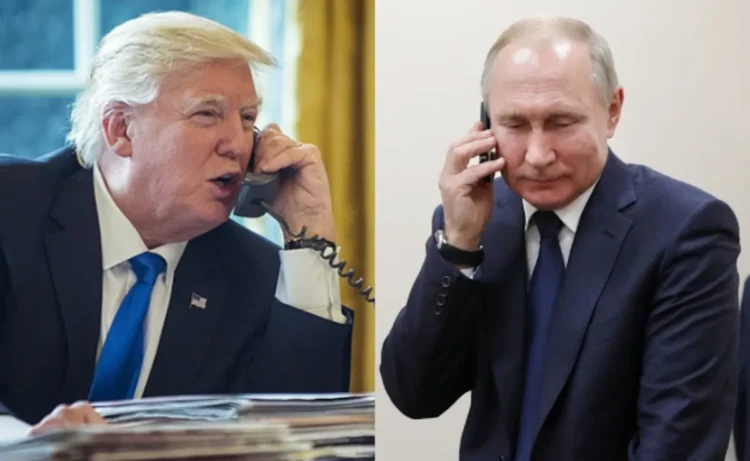Donald Trump spoke with Russian President Vladimir Putin today, Tuesday, regarding a ceasefire proposal for Ukraine as part of ongoing international efforts to resolve the crisis. The proposal, which was discussed last week by Ukrainian and U.S. delegates in Saudi Arabia, includes the possibility of a 30-day ceasefire, a deal that Ukraine has expressed readiness to accept.
Trump announced in a post on Truth Social that he would be speaking with Putin today. The U.S. president emphasized that while many elements of the peace agreement have already been agreed upon, much work remains to be done. He stressed the urgent need for peace, citing the continuous loss of soldiers—2,500 deaths per week from both sides—calling it a tragic situation that must end immediately. He added, “I look very much forward to the call with President Putin.”
Trump had previously stated that he believed peace was possible and hoped to secure a ceasefire and, ultimately, a lasting peace agreement. The White House echoed his optimism, suggesting that peace in Ukraine has “never been closer,” though there have been varying views within the Trump administration regarding the actual progress of the ceasefire talks. U.S. Secretary of State Marco Rubio, following his meeting with Ukrainian officials on March 11, stated that much of the discussion had focused on what the negotiation process might look like rather than the specific terms of the ceasefire. U.S. envoy Steve Witkoff, who met with Putin in Moscow last week, also adopted a more cautious tone, emphasizing the complexity of the situation.
On Russia’s side, Kremlin spokesman Dmitry Peskov refrained from commenting on the details of the phone call, adhering to the Russian government’s usual policy of keeping discussions between the leaders confidential. Putin has expressed conditional support for a ceasefire but has also raised concerns about how such a truce would function. He pointed to logistical and operational challenges that need to be addressed, questioning how the 30-day ceasefire period would be utilized and what mechanisms would be in place to monitor compliance. These concerns include whether Ukraine might use the ceasefire to regroup and rearm, as well as determining who would oversee the enforcement of the ceasefire and how violations would be assessed along a vast 2,000-kilometer front line.
The ongoing ceasefire discussions have already raised several contentious issues. Trump has hinted that territorial disputes could form a key part of the negotiations, including potential discussions about land and power plants. One of the most critical points in these talks is likely to involve the Zaporizhzhia nuclear power plant, which lies on the border between Russia and Ukraine. The facility, under Russian control since March 2022, remains a major concern due to the ongoing conflict in the area and fears of a potential nuclear disaster. Additionally, disputes over regions like Kursk have emerged, where Ukraine launched an incursion last summer and gained control of some territory. Russia has since attempted to recapture it, and Putin now claims full control over the region.
The international community has also responded to the ceasefire talks. Ukrainian President Volodymyr Zelensky has been vocal in criticizing Russia, accusing Putin of prolonging the war and stating that the proposed peace deal could have been implemented much earlier. Zelensky emphasized that every day of conflict results in the loss of human lives and called for an immediate cessation of hostilities. Meanwhile, French President Emmanuel Macron and newly elected Canadian Prime Minister Mark Carney reaffirmed their unwavering support for Ukraine, urging Russia to make clear commitments toward peace. Macron particularly praised Zelensky for his courage in agreeing to the ceasefire proposal and challenged Putin to do the same, stressing the urgent need to end the violence. In the UK, Foreign Secretary David Lammy called on Putin to agree to a “full and unconditional ceasefire,” stating that he had seen “no sign” that Putin was serious about a peace deal. He warned that the UK and its allies “have more cards to play” to pressure Russia into serious negotiations.
As the situation continues to unfold, the world watches closely to see whether today’s phone call between Trump and Putin can break the deadlock and pave the way for a long-awaited resolution to the Ukraine crisis.

 English
English



























































